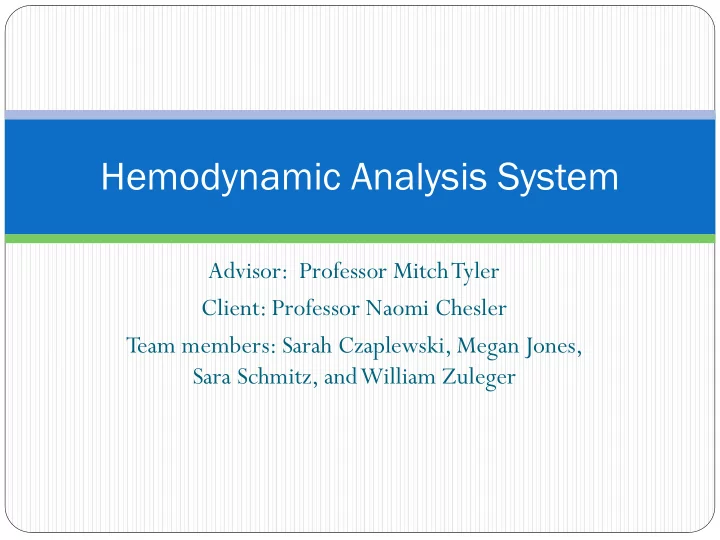

Hemodynamic Analysis System Advisor: Professor Mitch Tyler Client: Professor Naomi Chesler Team members: Sarah Czaplewski, Megan Jones, Sara Schmitz, and William Zuleger
Overview Pulmonary Hypertension Echocardiography and Right Heart Catheterization Project Motivation Current Analysis System Specifications for New Device Device System Diagram Proposed Hemodynamic Analysis Designs Assessment of Designs Construction and Validation
Pulmonary Hypertension (PH) • High pressure in pulmonary arteries • Heart cannot keep up with high pressures • Can lead to a number of issues: • Enlargement of the right heart • Fluid build up in liver or other tissues • Heart failure
Doppler Echocardiography • Use of standard ultrasound to image the heart Acoustic Signals Heart Transducer Tissue Returned Signals • Returned signals are Doppler shifted • The two frequencies are related by: • Measures instantaneous velocity and flow rates
Right Heart Catheterization • Measures pressure in the right heart and pulmonary arteries • Catheter inserted into major vein and threaded to the pulmonary artery • Used to monitor various heart conditions
Project Motivation Calculate pulmonary vascular impedance (PVZ) with Doppler echocardiography and right heart catheterization PVZ in diagnosing PH Determines artery stiffness Identifies defect location To calculate PVZ, must sync arterial flow & pressure Synchronizing device needed for earlier, more efficient detection of PH
Current Device Collects and analyzes right- heart catheterization, echo, and ECG data Raw data not synchronized Cannot calculate PVZ Provides excess data analysis Must be used in conjunction Front view of current device attached with large outdated PC to outdated laptop Cost: $30,000
Design Specifications Convert echo & catheter analog signals to digital output Synchronize time, pressure, and flow data Sample 20 times per cardiac cycle (50 Hz) Store data in a file for later interpretation Cost less than $1000/device Weigh less than 10 pounds, fit in a 12” cube Be aesthetically pleasing and professional
Conceptual System Diagram Digital Echo Outputs from Data Storage Output Echo A/D converter 1) Stores in a temporary Converts continuous buffer then transfers to a analog voltage PC hard drive Digital Catheter signal to discrete Output from 2) Data stream data Output digital points Catheterization directly to PC hard drive Software Shifts signals to synchronize Synchronized in time Flow and Performs FFT on echo Data from Stored Pressure Data signals File (both echo and Calculates blood velocity catheter) from Doppler shift
Design Alternative #1: Hardware Device ADC Data acquisition Hardware Signal Analysis Onboard Data storage USB or Firewire output Pros Tailored to specific problem Capable of synchronization Cons Complicated hardware integration Inadaptable
Design Alternative #2: Microcontroller ADC Data acquisition Microcontroller Signal Processing Onboard Data storage, or USB/Firewire PC interface Pros Reprogrammable Capable of synchronization Cons Slow signal processing with JAVA Input gain adjustments
Design Alternative #3: PC Oscilloscope USB ADC data capture Digital Oscilloscope Integrate with LabView for signal analysis Pros Adaptable design Simple data acquisition with high fidelity Simple prototyping Cons Expensive
Design Matrix Criteria Weight Microcontroller Hardware PC Device Oscilloscope Cost 5 5 4 1 Ease of Production 15 9 5 13 Ability to 20 15 15 20 Synchronize Aesthetics 5 5 5 5 Sampling 20 20 20 20 Frequency User Friendly 20 12 12 18 Interface Size 5 5 5 5 Adaptability 10 5 2 10 Total 100 76 68 92
Selected Design 2 PC Oscilloscopes working together to offer 4 inputs Parallax USB Model $139.95 each 4th input can be used as a potentiometer to calibrate input gain Design Specs 2 channels 500 KHz sample rate 200 KHz bandwidth 8 bit vertical resolution
Prototype Testing • Test synchronization of two oscilloscopes with a square wave • Connect to both right heart catheter and echo machine • Schedule times for use • Both must be present • Human subject • Test software/programming
Future Work • Order necessary parts, build the device, and test it • Gain experience using LabVIEW and/or MATLAB • Software programming : • Create code to calculate blood flow velocity • Include diameter of artery • Synchronize oscilloscopes
Acknowledgments Professor Mitch Tyler Professor Naomi Chesler Professor Dennis Bahr Professor William Schrage
Questions
References Text Arcasoy, S., et al. Echocardiographic Assessment of Pulmonary Hypertension in Patients with Advanced Lung Disease. Vol 167: pp 735-740. 2002. <http://ajrccm.atsjournals.org/cgi/content/full/167/5/735> Shung, K. K. Diagnostic Ultrasound: Imaging and Blood Flow Measurements. CRC Press: 2006. Tabima, D. M., et al. The effects of chronic hypoxia on pulmonary input, characteristic impedance and wave reflections: A comparison between time and frequency domain methods. http://www.nlm.nih.gov/medlineplus/ency/article/003869.htm http://www.nlm.nih.gov/medlineplus/ency/article/003870.htm http://www.heart.org/HEARTORG/Conditions/CongenitalHeartDefects/TheImpactofCongenitalHeartD efects/Pulmonary-Hypertension_UCM_307044_Article.jsp http://www.medicinenet.com/pulmonary_hypertension/article.htm Figures http://www.pphlaw.com/ (slide 3) http://www.musculoskeletalnetwork.com/hypertension/content/article/1145425/1404927?pageNumber =8 (slide 4) http://www.drugs.com/cg/right-heart-catheterization-inpatient-care.html (slide 5) http://www.parallax.com/Store/Microcontrollers/BASICStampProgrammingKits/tabid/136/ProductID/ 46/List/1/Default.aspx?SortField=ProductName,ProductName (slide 14)
Recommend
More recommend